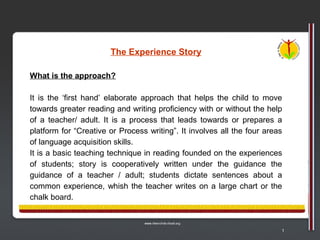Recommended
Recommended
More Related Content
Viewers also liked
Viewers also liked (17)
Tedxyouth@KL - Striving Towards a Cashless Society

Tedxyouth@KL - Striving Towards a Cashless Society
APSCA: Managing Fraud, Authentication Transactions - mPOS

APSCA: Managing Fraud, Authentication Transactions - mPOS
Similar to Experiece story
Similar to Experiece story (20)
R.I.P. "Sound It Out": What Else Can you Say (TWU)

R.I.P. "Sound It Out": What Else Can you Say (TWU)
The Language Experience Classroom Presentation Changed For Blog

The Language Experience Classroom Presentation Changed For Blog
Concept,Need and importance of Reading and Writing Skill 

Concept,Need and importance of Reading and Writing Skill
Grade 1 - 5 Parent Literacy Workshop (September 2016)

Grade 1 - 5 Parent Literacy Workshop (September 2016)
Early Literacy Workshop at Proud fo My Culture 2020

Early Literacy Workshop at Proud fo My Culture 2020
Dialogic ReadingEmily Alers, Kaelin Berthold, Isabella Buscemi.docx

Dialogic ReadingEmily Alers, Kaelin Berthold, Isabella Buscemi.docx
Dialogic ReadingEmily Alers, Kaelin Berthold, Isabella Buscemi.docx

Dialogic ReadingEmily Alers, Kaelin Berthold, Isabella Buscemi.docx
Learners and Learning: Section Four: Text as a context for learning

Learners and Learning: Section Four: Text as a context for learning
There Is No Can't: AAC, Literacy & Meeting Complex Needs

There Is No Can't: AAC, Literacy & Meeting Complex Needs
T 4.1 slideshare or scribd resource writing + vocabulary

T 4.1 slideshare or scribd resource writing + vocabulary
More from contactustos
More from contactustos (14)
Experiece story
- 1. The Experience Story What is the approach? It is the ‘first hand’ elaborate approach that helps the child to move towards greater reading and writing proficiency with or without the help of a teacher/ adult. It is a process that leads towards or prepares a platform for “Creative or Process writing”. It involves all the four areas of language acquisition skills. It is a basic teaching technique in reading founded on the experiences of students; story is cooperatively written under the guidance the guidance of a teacher / adult; students dictate sentences about a common experience, whish the teacher writes on a large chart or the chalk board. 1
- 2. Stages in the ‘Experience story’ approach: • Give the children the experience. Do as much of “Teacher / Adult Talk” at this stage. (LISTENING) • Let the children talk about their experience. Stress on the sequence / order of events. (SPEAKING) • As a teacher / adult, you write down all the things the children have said “Verbatim on a chart. Get the kids to read it as often as possible. (READING) • Alternately, ask the children to write about it in their own words if they are feeling “upto it”! (WRITING) 2
- 3. A note on “VERBATIM”: The reason for writing what children speak in the very same way that they say it, is, that it shows them the close relationship between speaking and writing. This in turn makes it easier for them to express their thoughts in print, as they get older. Besides, when it comes to writing (a highly creative process!) there is a strong sense of ownership to the written piece which evokes statements like “You know I told this sentence to teacher!” or “That’s my sentence!” which, needless to say, provides a strong motivation to read and write creatively. “What I hear I forget, What I see I remember, What I do I (experience) I understand” (…and whatever a child understands he/ she always remembers; never forgets!!) 3
